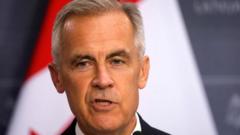Is Canada the First G7 Nation to Recognize a Palestinian State?

Published: 2025-09-21 18:00:21 | Category: wales
In a landmark diplomatic shift, Canada has become the first G7 country to officially recognise the State of Palestine, with Prime Minister Mark Carney highlighting the importance of building a peaceful future. This recognition has been swiftly followed by similar announcements from Australia and the UK, amid increasing international pressure on Israel regarding the humanitarian crisis in Gaza and ongoing settlement activities in the West Bank. This article explores the implications of these recognitions, the historical context, and the broader geopolitical landscape surrounding this significant development.
Last updated: 05 October 2023 (BST)
Key Takeaways
- Canada, Australia, and the UK have formally recognised the State of Palestine.
- The move reflects growing international pressure on Israel amid a humanitarian crisis in Gaza.
- Recognition is viewed by some as a potential reward for Hamas, complicating diplomatic relations.
- Approximately 75% of UN member states already recognise Palestine as a state.
- The recognition aligns with calls for a two-state solution to the Israeli-Palestinian conflict.
The Background of Canada's Recognition
On Sunday, Canadian Prime Minister Mark Carney announced that Canada officially recognises the State of Palestine, stating that this decision offers "our partnership in building the promise of a peaceful future for both the State of Palestine and the State of Israel." This recognition follows a pattern of diplomatic gestures from Canada, Australia, and the UK, which have all hinted at their intentions to acknowledge Palestine as a sovereign state.
Historically, the recognition of Palestinian statehood has been a contentious issue, heavily influenced by the ongoing Israeli-Palestinian conflict. Since 2012, Palestine has held the status of a non-member observer state at the United Nations, a position supported by approximately 75% of UN member nations. The announcement from Canada marks a significant shift, as it is the first G7 nation to take this step, potentially signalling a shift in global diplomatic attitudes towards the Palestinian cause.
Context of the Humanitarian Crisis
The timing of this recognition coincides with a severe humanitarian crisis currently unfolding in Gaza. Following the 7 October 2023 attack by Hamas, which resulted in the deaths of 1,200 individuals and the hostage-taking of 251 others, Israel's military response has led to widespread devastation in Gaza. The humanitarian implications are dire, with reports of significant casualties and displacement among the Palestinian population.
Prime Minister Carney emphasised that the recognition of Palestine is not a reward for Hamas but rather a commitment to support the Palestinian Authority in its governance efforts. He asserted that it is "imperative that Hamas release all hostages, fully disarm, and play no role in the future governance of Palestine.” This statement highlights the delicate balance that must be maintained in international diplomacy concerning the recognition of states involved in conflict and terrorism.
International Reactions
The recognitions by Canada, Australia, and the UK have sparked varied international responses. Israeli officials have condemned the moves, claiming they reward terrorism and undermine efforts toward peace. In a statement, the Israeli foreign ministry stated, "Recognition is nothing but a reward for jihadist Hamas," reflecting the ongoing tensions surrounding the issue.
The United States, which has traditionally been an ally of Israel, expressed its disapproval of these recognitions. Secretary of State Marco Rubio labelled France's impending recognition of Palestine as "reckless," indicating a potential diplomatic rift within the G7 regarding the Israeli-Palestinian conflict. This divergence may reshape alliances and diplomatic strategies in the region, particularly as international bodies prepare to address the situation at the upcoming UN meetings.
The Two-State Solution: A Long-standing Goal
The notion of a two-state solution has been a cornerstone of peace efforts in the Israeli-Palestinian conflict, advocating for the establishment of a sovereign Palestinian state alongside Israel. Carney reiterated this commitment, stating that every Canadian government since 1947 has endorsed the two-state solution as the most viable path to peace. However, he lamented that the prospects for this solution have been "steadily and gravely eroded," citing various factors that have hindered progress.
He outlined four reasons contributing to the decline of the two-state solution, including:
- Ongoing settlement expansion by Israel in the West Bank.
- The lack of democratic reforms within the Palestinian Authority.
- The influence of Hamas and its violent tactics.
- Escalating violence and humanitarian crises that further entrench divisions.
The Future of Palestinian Statehood
The recognition of Palestine by Canada, Australia, and the UK may pave the way for increased diplomatic engagement and support for Palestinian statehood. However, the path forward remains fraught with challenges, particularly with the ongoing violence in Gaza and the complex political landscape within both Israel and Palestine.
What Happens Next?
As the international community prepares for discussions at the UN, the focus will likely remain on the humanitarian situation in Gaza and the broader implications of recognising a Palestinian state. The responses from Israel and the United States will also be critical in shaping future diplomatic efforts.
Moving forward, the recognition of Palestine by these nations raises significant questions about the efficacy of existing peace processes and the role of international law in resolving longstanding conflicts. The potential for further recognitions from other nations could amplify calls for a renewed focus on diplomatic solutions and humanitarian aid, particularly as the crisis continues to unfold.
FAQs
Why did Canada recognise the State of Palestine?
Canada recognised the State of Palestine to support peace-building efforts and align with international law, while also emphasising the need for democratic reforms in Palestinian governance.
What are the implications of this recognition for Israel?
The recognition could complicate Israel's diplomatic relations and is seen as a potential reward for Hamas, which Israel views as a terrorist organisation, potentially undermining peace efforts.
How does this recognition affect international views on the Israeli-Palestinian conflict?
This move may shift diplomatic perspectives, with increasing support for Palestinian statehood amidst growing concerns over humanitarian issues and settlement expansions in the West Bank.
What is the two-state solution?
The two-state solution proposes the establishment of an independent Palestinian state alongside Israel, ideally leading to peace and mutual recognition of sovereignty.
What challenges does the Palestinian Authority face?
The Palestinian Authority faces significant challenges, including governance issues, the influence of Hamas, and ongoing Israeli settlements that complicate the prospect of a viable state.


